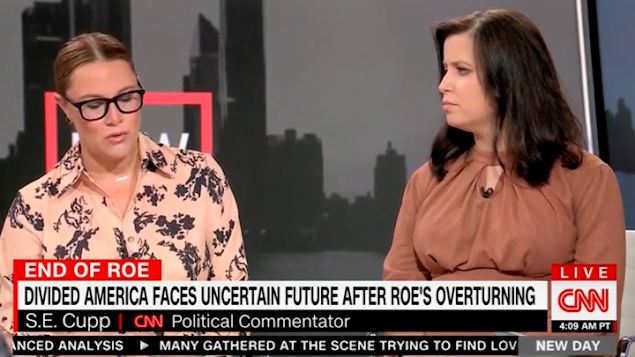End of Roe v. Wade and other ‘regressive bulls---’ will make it hard for GOP to survive: CNN’s S.E. Cupp
On Monday, CNN host S.E. Cupp claimed she has hard time believing that the Republican Party can survive the end of Roe v. Wade and all the other "regressive bulls---" they’ve been pushing for, such as "book banning."
Cupp, who has her own show on CNN, spoke to a panel of pundits on Monday's episode of New Day and expressed her opinion that the GOP would electorally rue the day that the Supreme Court overturned Roe v. Wade.
New Day co-host John Berman prompted Cupp’s answer, asking, "now that anti-abortion activists got what they wanted, right, which is to overturn Roe v. Wade, what happens now politically, do you think?"
"It’s hard to imagine the Republican Party surviving this," Cupp began, adding that because of this and other "regressive bulls---" policies, she doesn’t see a future for the GOP.
"Between anti-abortion, anti-LGBTQ, book banning, anti-democracy, I mean, add all of the regressive bulls--- – garbage, sorry – to this," she stated, adding, "I don’t take that back."
She then claimed, "Um, add it all together and I don’t know who is left in the future — in future generations to be drawn to this party."
The pundit argued that Trump voters in 2016 had a wider array of reasons for voting for the party than they do now, at least reasons that Cupp said made some sense to her. "If you look back at 2016 I think people voted for Trump for a wide array of reasons, some of them garbage, but some of them legitimately economic or even foreign policy," she claimed.
Now not so much. "I think the people voting for more Trump, more MAGA now are really motivated by very few reasons, and so there are fewer of them," Cupp added.
Cupp played up the drama of the situation, stating that since Roe v. Wade has been overturned, a generation of people don’t have a right that their parents did. "And when you imagine that, I think for the first time – maybe we should ask Jeff Toobin – a generation will be able to say my parents had a right that I don’t have today."
"For the first time a right was taken back," Cupp proclaimed. She then declared, "I can’t imagine how Republicans message to new voters and don’t just keep shrinking and condensing."
Cupp is pro-choice and has expressed support for Roe v. Wade in the past. Despite her pro-abortion stance, the CNN host made recent news for rebuking fellow CNN colleague Ana Navarro after she claimed that abortion is necessary for families who need options for dealing with special needs children.
On Twitter, Cupp told Navarro, "I have an autistic child. I have never met a parent of an autistic child or any parent of a special needs child who said they’d wished they’d aborted him or her."


